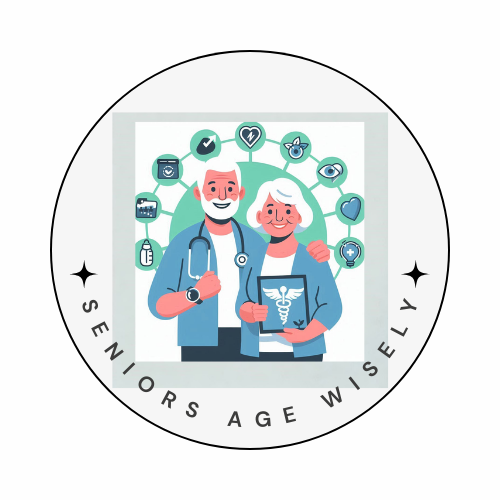
Aging is a natural part of life, but it comes with its own set of challenges—especially when it comes to health. If you’re like many seniors, you may find yourself dealing with chronic illnesses, cognitive decline, and mobility issues, which can impact your quality of life. Like me, you may also find yourself often investigating or discussing health topics for seniors. The good news? With the right strategies, seniors can take charge of their health and maintain independence and well-being.
In this article, we’ll explore common seniors’ health challenges and solutions and practical ways you can manage them.
Recognising Seniors’ Common Health Challenges
1. Chronic Diseases
As we age, the risk of chronic diseases increases. Conditions such as heart disease, diabetes, arthritis, and respiratory illnesses become more prevalent. These illnesses can affect daily activities and require ongoing management.
2. Cognitive Decline
Memory loss and cognitive decline are common concerns among older adults. Some may experience mild forgetfulness, while others face more severe conditions like dementia or Alzheimer’s disease, which can make daily living difficult.
3. Functional Limitations
Aging can bring physical limitations, including reduced mobility, poor balance—balance challenges for seniors is quite common—and weakened vision or hearing. These changes can increase the risk of falls and injuries, leading to greater dependence on others.
4. Mental Health Issues
Depression, anxiety, and feelings of loneliness are common among seniors. Social isolation, loss of loved ones, and chronic pain can all contribute to mental health struggles.
5. Geriatric Syndromes
Geriatric syndromes include a mix of issues that affect older adults, such as frailty, incontinence, pressure ulcers, and delirium. These conditions can result from multiple underlying factors and often require comprehensive care.
6. Respiratory Issues
Many seniors deal with breathing difficulties, ranging from mild allergies to chronic obstructive pulmonary disease (COPD) and pneumonia. These conditions can reduce energy levels and make physical activity more challenging.
7. Cardiovascular Diseases
Heart disease remains one of the leading causes of death among older adults. High blood pressure, high cholesterol, and other cardiovascular risks require careful monitoring and lifestyle adjustments.

How Seniors Can Take Charge of Their Health
While aging presents challenges, as a senior, you can adopt strategies to manage your health effectively and enjoy a fulfilling life.
1. Stay on Top of Healthcare Needs
Routine medical check-ups are essential for catching health problems early. You should prioritize:
- Regular doctor visits and screenings
- Vaccinations to prevent infections like flu and pneumonia
- Managing chronic conditions with professional guidance
2. Take Medications as Prescribed
Many seniors take multiple medications, which can be confusing. To stay on track:
- Use pill organizers or reminders to avoid missing doses
- Communicate with doctors about side effects or possible interactions
- Never adjust dosages without consulting a healthcare provider
3. Maintain a Healthy Lifestyle
A well-balanced diet and regular exercise go a long way in preserving health. Seniors should aim to:
- Eat a diet rich in fruits, vegetables, lean proteins, and whole grains
- Stay hydrated and limit processed foods
- Engage in moderate physical activities like walking, yoga, or swimming
- Avoid smoking and excessive alcohol consumption
4. Prevent Falls and Injuries
Falls are a leading cause of injury among seniors, but simple precautions can help:
- Remove trip hazards like loose rugs and clutter
- Install grab bars in bathrooms and railings on stairs
- Use supportive footwear with non-slip soles
- Keep up with vision and hearing check-ups to improve spatial awareness
5. Keep the Mind Active
Cognitive decline can be slowed with mental stimulation. Seniors should:
- Read books, do crossword puzzles, or play brain games
- Learn a new skill or hobby, such as painting or playing an instrument
- Stay socially engaged through clubs, volunteering, or family gatherings
6. Prioritize Mental Health
Seniors should pay attention to their emotional well-being by:
- Connecting with loved ones regularly
- Participating in community activities
- Seeking professional help if experiencing prolonged sadness or anxiety
Conclusion
Aging presents many health challenges, but it doesn’t have to mean giving up on an active and fulfilling life. By taking proactive steps—like staying on top of healthcare, maintaining a healthy lifestyle, and preventing falls—as a senior you can manage your health effectively. The key is to stay engaged, seek support when needed, and embrace a lifestyle that promotes well-being.
By making thoughtful choices, you can continue to lead independent, healthy, and happy lives well into your golden years. Remember, healthy body healthy mind!
Look out for my upcoming posts where I talk more specifically about senior fitness nutraceuticals products, supplements that can help with managing different conditions we face as we age.

Affiliate Disclosure
Here’s a little transparency: Our website contains affiliate links. This means if you click and make a purchase, we may receive a small commission. Don’t worry, there’s no extra cost to you. It’s a simple way you can support our mission to bring you quality affiliate marketing content.
